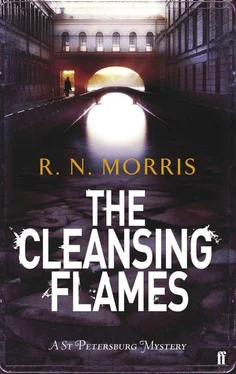R. Morris - The Cleansing Flames
Здесь есть возможность читать онлайн «R. Morris - The Cleansing Flames» весь текст электронной книги совершенно бесплатно (целиком полную версию без сокращений). В некоторых случаях можно слушать аудио, скачать через торрент в формате fb2 и присутствует краткое содержание. Год выпуска: 2011, ISBN: 2011, Издательство: Faber and Faber Fiction, Жанр: Исторический детектив, на английском языке. Описание произведения, (предисловие) а так же отзывы посетителей доступны на портале библиотеки ЛибКат.
- Название:The Cleansing Flames
- Автор:
- Издательство:Faber and Faber Fiction
- Жанр:
- Год:2011
- ISBN:0571259154
- Рейтинг книги:5 / 5. Голосов: 1
-
Избранное:Добавить в избранное
- Отзывы:
-
Ваша оценка:
- 100
- 1
- 2
- 3
- 4
- 5
The Cleansing Flames: краткое содержание, описание и аннотация
Предлагаем к чтению аннотацию, описание, краткое содержание или предисловие (зависит от того, что написал сам автор книги «The Cleansing Flames»). Если вы не нашли необходимую информацию о книге — напишите в комментариях, мы постараемся отыскать её.
The Cleansing Flames — читать онлайн бесплатно полную книгу (весь текст) целиком
Ниже представлен текст книги, разбитый по страницам. Система сохранения места последней прочитанной страницы, позволяет с удобством читать онлайн бесплатно книгу «The Cleansing Flames», без необходимости каждый раз заново искать на чём Вы остановились. Поставьте закладку, и сможете в любой момент перейти на страницу, на которой закончили чтение.
Интервал:
Закладка:
At the same time, he could not bring himself to push it back under his bed.
He was a rationalist. To unlock the trunk in the expectation of finding the solution he had seen in his dream was not the behaviour of a rationalist. And what if the solution turned out to be there, just as his dream predicted? The ramifications of that were devastating. He was beset by a fleeting premonition, a sense of imminent disintegration.
If his dream were proven to be true, he would be brought to a critical moment in his political as well as his inner live, a genuine crisis. It was far better that the lid remained closed, particularly as his rationalism told him that there could be nothing in it anyhow. One did not dream the solutions to the crimes one was investigating.
He pushed the trunk back under his bed.
He extinguished the candle and lay back down. He closed his eyes but sleep felt a long way off now. He tried to analyse what had just happened. There must be a psychological explanation for his dream, the rationalist in him decided.
The devastation at Kozodavlev’s apartment had naturally made him think of Easter Sunday night when he had gone to witness the fires at the vodka warehouse. Furthermore, Porfiry Petrovich’s theories about Kozodavlev’s radicalism — together with his fixation on the novel Swine — had naturally influenced Virginsky. The dream, in which Kozodavlev had made an appearance, was therefore perfectly explicable. The details were already fading but he thought that it had been to do with a revolutionary cell. For some reason, the Prokharchin children were involved too. Had they been the members of the cell? A ridiculous idea, but that was the way with dreams. And therefore, all the more reason not to act on them.
Certainly, the urgent sense of discovery that had stung him from his sleep had faded. He could not even remember what it was that had almost convinced him to look in the trunk. He began to relax, welcoming the slow dissolution of his being that presaged sleep.
*
As he had intimated he would, Porfiry visited a cemetery on the Feast of Radonitsa. He had learnt from the landlady that the children were to be buried that day, at the Smolenksoe Cemetery on Vasilevsky Island. A procession would set out from the Koshmarov Apartment Building at ten.
There had been a subscription to help with funeral costs, to which both Porfiry and Virginsky had contributed. An edge of hostility had crept into Virginsky’s voice when he answered Porfiry’s question of whether he intended to give something, or not. It seemed that he had detected some kind of slight in the pause Porfiry allowed between the alternatives.
It was the finest day of the spring so far. There had been an explosion of buds in the city’s gardens and parks. The bird-cherry trees were in blossom everywhere. In sending forth its shoots and stems, the earth seemed to be straining up towards the sky, drawn by its inhuman weightlessness. And yet it took a great effort of will on Porfiry’s part to lift his face towards the exuberant light.
The Prokharchins’ friends and neighbours had done them proud. Yekaterina Ivanovna alone had given one hundred assignat roubles. No expense was spared. To bear the five small coffins were two white funerary carriages, their elaborate canopies draped in lace and decked in spring flowers. Each carriage was drawn by a pair of white horses. Ahead of the hearses walked a line of attendants, their white flowing coats and white top hats flashing brilliantly in the sunlight. Behind came the mourners in black. The way was strewn with flowers, scattered from another carriage that led the procession.
The children’s parents clung together. It seemed more that they were pulling each other down than giving mutual support. But somehow they managed to keep walking. They were impelled by the inevitability of the procession. This is what a funeral procession is for , thought Porfiry, why it is necessary. So that those most struck by grief may know where to direct their feet .
It was the first sight Porfiry had caught of Prokharchin. The man seemed to be in one of the stages of delirium tremens, so violently was he shaking. His feet came down with an exaggerated, slightly wayward tread, as if they were constantly trying to free themselves from the restraint of his ankles.
It was a long slow way to the cemetery, which was at the north of the island. They crossed the river over the Nikolaevsky Bridge. Now in full flow, the heedless Neva rushed away from the shuffling line of humanity, leaving it to its woes.
*
Virginsky wrote out the rows of letters:
Go
Of m
Stit
No
He felt immediately the hopelessness of the task he had been set. It was not a code. It was simply the first few letters of four lines of text. The letters in themselves meant nothing, or any meaning they suggested was illusory. They had been severed from their true meaning by a random accident. If the piece of paper had any significance at all, it was to be found in the larger, missing text. That is to say, it was beyond his reach. Therefore, no matter how much he applied himself, he would never be able to make sense of the letters in front of him.
The fragment seemed to start with an exhortation and end with discouragement. Between was nonsense. All too appropriate , decided Virginsky.
And yet, as Virginsky repeated the truncated chant that the letters spelled out — Go, Of m, Stit, No, Go, Of m, Stit, No — the significant detail struck him. Each of the four lines began with a capital letter. He could assume that the text these letters came from was a poem of some kind.
With this first realisation came another: he had seen these letters before. However, he was far less certain of this than he was of the letters’ poetic provenance. He remembered waking from his dream the night before, but by now all the details of the dream were irretrievably lost to him. Had he also dreamt of pulling the tin trunk out from under his bed? His memory of that seemed to be of a different quality to the sense he had of the vanished dream.
The mood of the previous night came back to him, in particular his sense of appalled rationality. Now, in the cold light of day, he was not so sure that his refusal to open the trunk was in fact the right decision, even from a supremely rationalist standpoint. A rationalist would be able to accept that the mind — even his own mind — was at times irrational. He would reason that this aspect of the mind must not be ignored. Ignored, it would only grow and fester in secret. Far better to confront it with its own absurdities, to wage open war constantly against its calamitous influence. Far better, in other words, to have opened the trunk and to have proven to himself the folly of his delusions.
Virginsky pulled a wincing face. He was reasoning himself into acting like a superstitious peasant, trusting to dreams and omens. No. The trunk must remain under the bed, its lid firmly closed. Until he had another manifesto to add to his collection, that is.
To do otherwise would be to give in to irrationalism, not to fight it.
*
It was after lunch when Porfiry returned to his chambers. To Virginsky, it seemed that his face was greyer than it had been when he had last seen him. There was a wan emptiness to his expression. He seemed hunched in on himself, reduced somehow. But when he spoke there was a rasp of determination, a fierce impatient quality to his voice. Judging by his voice alone, one would have said that Porfiry had been energised by the Feast of Radonitsa.
‘How are you getting on with those letters? Have you deciphered them yet?’
‘It is not a question of deciphering them,’ complained Virginsky. He took Porfiry through his reasoning, though he omitted to tell him about his dream, and his consequent indecision.
Читать дальшеИнтервал:
Закладка:
Похожие книги на «The Cleansing Flames»
Представляем Вашему вниманию похожие книги на «The Cleansing Flames» списком для выбора. Мы отобрали схожую по названию и смыслу литературу в надежде предоставить читателям больше вариантов отыскать новые, интересные, ещё непрочитанные произведения.
Обсуждение, отзывы о книге «The Cleansing Flames» и просто собственные мнения читателей. Оставьте ваши комментарии, напишите, что Вы думаете о произведении, его смысле или главных героях. Укажите что конкретно понравилось, а что нет, и почему Вы так считаете.












